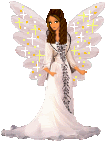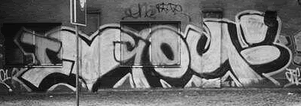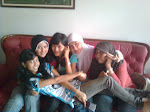Senin, 05 April 2010
1. ARTICLES
There are two kinds of articles :
- Definite Articles
- The use of “The” :
1. “The” is used for the singular and plural and for all genders.
Example : the boy, the girl, etc.
2. “The” is used when the object or group of objects is unique or considered to be unique.
Example : the sky, the star, etc.
3. “The” is used before a noun which has become definite or as a result of being mentioned a second time.
Example : This car struck a tree, you can still see the mark on the tree.
4. “The” is used before the superlative degree and such as only, first, and second.
Example : the first week, the only way, etc.
5. “The” is used before certain proper names of seas, rivers, group of island .
Example : the Atlantics
6. “The” is also before certain others name.
Example : thr city, the mall, etc.
- Indefinite Articels
- The use of “a/an” :
1. “a” is used before a word beginning of a consonant, or a vowel with consonant sound.
Example : a man, a woman, a university, etc.
2. “an” is used before word beginning with a vowel (a,i,u,e,o) or words beginning with a mute “h”.
Example : an apple, a honest, an hour, etc.
3. “a/an” is used before a singular noun which is uncountable.
Example : I need a visa.
4. “a/an” is used with a noun complement. These include names of profession.
Example : He is an actor.
5. “a/an” is used in certain expression of quantity.
Example : a couple, a glass of, etc.
2. ADJECTIVES
Adjectives fall into two categories :
A. descriptive adjectives are those which describe the color, size, or quality of a person or thing (noun or pronoun).
B. limiting adjectives place restricions on the words they modify (quantity, distance, possesion, etc.)
| DESCRIPTIVE | LIMITING |
| Beautiful | Cardinal numbers (one,two) |
| Large | Ordinal number (first, second) |
| Red | Possessives (my, your, his) |
| Interesting | Demonstratives (this, that, these, those) |
| Important | Quantity (few, many, much) |
| Colorful | Articles (a, an, the) |
When descriptive adjectives modify a singular countable noun, they are usually preceded by a, an, or the.
Example : 1. a pretty girl
2. an interesting story
3. the blue dress
3. ADVERB
Adverb modify verb (except linking verb), adjectives, or other adverbs. Many descriptive adjectives can be changed to adverb by adding –ly to the adjectives base.
| ADJECTIVES | ADVERB |
| Bright | Brightly |
| Careful | Carefully |
| Quiet | Quietly |
The following word are also adverb : so, very, almost, soon, often, fast, rather, there, well, too. An adverb answers the questions : “How…???”
Example :
How is John reading?
John is reading carefully.
4. MODALS AUXILIARY
Modals is auxiliary verb or helpings verbs consisting of shall, should, will, would, can, could, may, might, ought to, need, dare, used to. Said the word is placed before of the verb or after the subject .
1. Shall the use for :
- To express the future with the subject I or we.
Example : I shall leave for American tomorrow.
- To promise
- To threat
2. Should the use for :
- Past from shall if located at clause.
- The meaning “should” in present.
- The meaning “suggestion”.
3. Will the use for :
- In future.
- To promise
- To polite request
4. Would the use for :
- Type past from “will” if located at clause.
- More polite request
- The meaning “want” if added “like”(would like = want)
5. Can the maning is :
- Ability at present
- Permission
6. Could the meaning is :
- Type pas from “can” if located clause.
- Ability in the past
- Permission
7. May the meaning is :
- Permission
- Probability
8. Might the meaning is :
- Type Past from “may” if located clause.
- probability
9. Must the meaning is :
- Must, Example: You must study hard.
- Certain, Example : Andi bought a new car, he must be rich.
10. Need the use for :
- As regular verbs. Example : Do you need a new book?
- As auxiliary verb. Example : Need you go so soon?
5. A. CONDITIONAL SENTENCE WITH IF
There are three types of if- clauses.
Type condition :
| If- clause | Main clause |
| 1. Simple Present | Will future |
| 2. Simple Past | Would + infinitive (conditional) |
| 3. Past Perfect | Would + have + past participle (conditional) |
Example :
Type I
- Positive : If I learn, I’ll pass the exam.
- Negative : If I learn, I won’t fail the exam.
Type II
- Positive : If I learnt, I would pass the exam.
- Negative : If I learnt, I wouldn’t fail the exam.
Type III
- Positive : If I had learnt, I would have passed the exam.
- Negative : If I had learnt, I wouldn’t have failed the exam.
Would can be substituted with could or might.
Should, may or must are sometimes possible as well.
B. CONDITIONAL SENTENCE WITHOUT IF
1. Unless (if…not…)
Example : Unless I hurry, I’ll miss the train.
2. As/so long as (if but only if)
Example : You can borrow my camera as long as you are careful with it.
3. And (to join two ideas instead of using an if clause) and or else
Example : Don’t try to lift that box or else you will hurt yourself.
4 Should
Example : Should we have enough time, we will visit John.
6. NOUN
A noun is a word used to name a person, animal, place, thing, and abstract idea. Nouns are usually the first words which small children learn. The highlighted words in the following sentences are all nouns:
- Late last year our neighbours bought a goat.
- Portia White was an opera singer.
- The bus inspector looked at all the passengers' passes.
- According to Plutarch, the library at
- Philosophy is of little comfort to the starving.
A noun can function in a sentence as a subject, a direct object, an indirect object, a subject complement, an object complement, an appositive, an adjective or an adverb.
Label: TUGAS EBC-ENGLISH






















0 komentar:
Posting Komentar